Anatomy Of A Habit: 10 Excuses That No Longer Work. Or Do They?
ANATOMY OF A HABIT: 10 EXCUSES THAT NO LONGER WORK. OR DO THEY? (Issue 43)
By Diane Gold
A habit is a fascinating little “acquired behavior pattern regularly followed until it becomes almost involuntary,” according to the dictionary from Ask.com (owned by InterActive Corp., new owner of About.com, bought from The New York Times last week. Understanding the credentials of the dictionary I am using somewhat helps me evaluate the definition I am putting to print).
Since this definition of “habit” correlates well with Charles Duhigg’s The Power Of Habit, which I am reading, I am satisfied that it is a good representation of what a habit is.
 Since I am about to speak on animal experiments, let me say that I applaud any research that does not involve the use of animals (gorillas already have rights) , that any animal should have the right to live a leisurely life in a posh facility as a reward if s/he has donated her time to human science;
Since I am about to speak on animal experiments, let me say that I applaud any research that does not involve the use of animals (gorillas already have rights) , that any animal should have the right to live a leisurely life in a posh facility as a reward if s/he has donated her time to human science;
computer simulation or sculpture as education should be used instead of working with animals; and any facility that uses animals should have a mandatory residence with services and staff for aged-out animals that has been paid for up front in case the facility loses funding. Now on with the article.
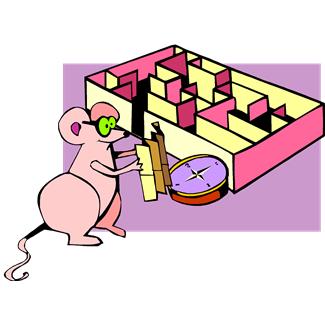 In Charles Duhigg’s book, cited above, he talks about experiments done by the National Institute on Alcohol Abuse and Alcoholism, where they studied habits using mice. They gave the mice a cue – which is the first of the three-part make-up of a habit – and, thus, created a habit. When the mice had learned to successfully respond to the cue, in this case, pull a lever, they were rewarded with food. This went on until it was quite routine for the cue, the action (the second part in the habit cycle) and the reward (the 3rd piece of the cycle).
In Charles Duhigg’s book, cited above, he talks about experiments done by the National Institute on Alcohol Abuse and Alcoholism, where they studied habits using mice. They gave the mice a cue – which is the first of the three-part make-up of a habit – and, thus, created a habit. When the mice had learned to successfully respond to the cue, in this case, pull a lever, they were rewarded with food. This went on until it was quite routine for the cue, the action (the second part in the habit cycle) and the reward (the 3rd piece of the cycle).
Phase 2 in the study involved poisoning the food so that the mice got sick upon eating it. The floor that led to the food was also electrified, causing a shock to the mice if they walked on it. They stopped going for the food and walking on the floor. Until they were shown their cue again. Then, automatically, because the habit was so ingrained in them, they walked on the floor, got shocked, ate the poisoned food and vomited.
This behavior is so common in humans, and we now know it is the pathways in our brain that get embedded with habits, not all the environmental stuff we always blame. When we feel the rise of a particular hormone in our bodies, this is our cue. We begin craving whatever it is we have trained ourselves to crave. We have two choices. Go get the reward we have trained ourselves to get, or go do something that will replace the old reward. Yes, we can create new habits, but we have to begin doing just that.
Click the image below for help at WarriorsOfWeight Consulting. .
.
Duhigg, in his The Power of Habit writes an accounting of Wolfram Schultz, a neuroscience professor who worked with macaques. Using the same cue, acquired action, reward system; Schultz taught Julio, an 8-pound macaque, to touch a lever when he saw a particular cue.
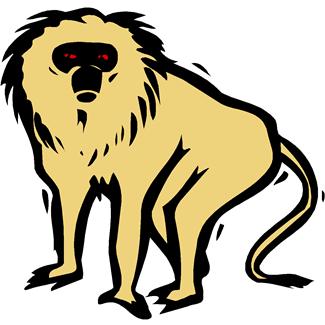 For this action, he would get a reward of juice. After repeating this cycle – cue, acquired action (Duhigg calls this “routine”), reward – touching the lever to get his reward became an ingrained habit.
For this action, he would get a reward of juice. After repeating this cycle – cue, acquired action (Duhigg calls this “routine”), reward – touching the lever to get his reward became an ingrained habit.
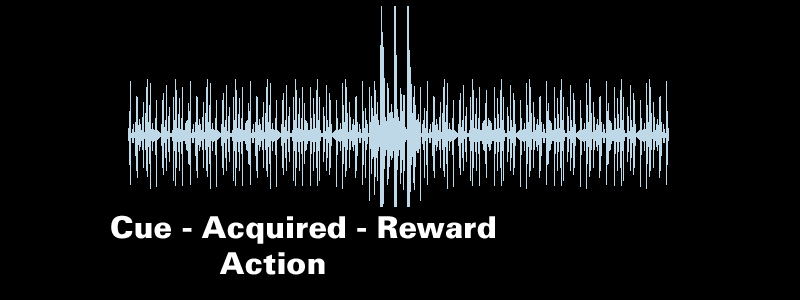 Schultz had had an electrode placed in Julio’s brain to read his neurological activity. It showed that Julio would get excited or happy when he got his reward. More activity at reward time in this simulation.
Schultz had had an electrode placed in Julio’s brain to read his neurological activity. It showed that Julio would get excited or happy when he got his reward. More activity at reward time in this simulation.
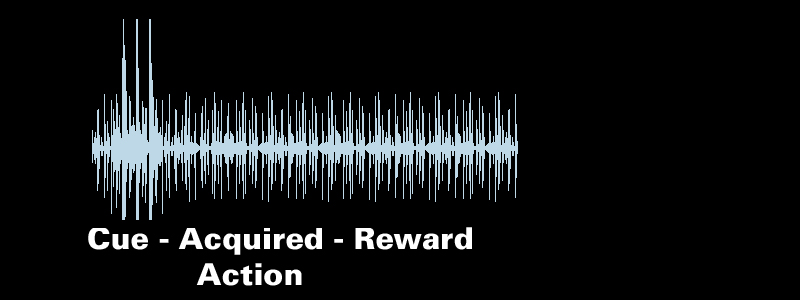 As Julio’s habit became stronger, from more time doing the same behavior, his neurological activity changed. The spike in activity came from anticipating his reward. So the cue became the trigger. The excitement that used to come from the reward was now coming when he saw the cue (in this case, it was visual). Ah, primates! How alike we all are.
As Julio’s habit became stronger, from more time doing the same behavior, his neurological activity changed. The spike in activity came from anticipating his reward. So the cue became the trigger. The excitement that used to come from the reward was now coming when he saw the cue (in this case, it was visual). Ah, primates! How alike we all are.
This sounds like all of us who have walked through fire to satisfy our habits, whether candy, drugs, bread, gambling, being late, staying lethargic, a relationship, a lifestyle. Of course, everyone is different. And changing a behavior is different in each of us. And there are so many factors involved as there are chemical levels in our body, tendencies in our heredity, environmental cues that are habits we are not aware of, and more.
There are so many questions that arise from hearing about habits. Why does one of two twins raised in the same household have a more difficult time changing a habit than her twin? So many reasons.
EXCUSES
Let’s talk about excuses. Many of us come up with reasons why we are habitual. How true can these be if our neurons change automatically with repetition? Does that mean that all the following excuses have to be thrown out?
1) I drink because my mother was mean to me.
2) I overeat because I was an only child.
3) I gamble because we were poor.
4) I have excessive behavior because I was sent away to boarding school.
5) I compulsively shop because they fed us junk food in school.
6) I hoard things in my house because my friends didn’t like me.
7) I overmedicate because my grand aunt did.
8) I steal clothing all the time because I was abused.
9) I will always be late because we ate fast food at home every night.
10) I have an excuse because my parents weren’t ever home when I came home from school.
We all have used an excuse for our behavior. Most of us have, anyway. Can an adult habit be attributed to a childhood experience? Probably yes, but proclaiming it is not going to change the habit.
HABIT CONTROL
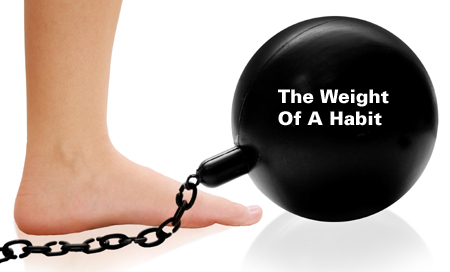 Let’s talk about Julio, the macaque, again. He had a strong habit. When the professor took away his reward or reduced the sugar content in his juice, he would become angry or depressed. He was hard to distract even when he was given the opportunity to go out of the experiment area and socialize with others because he was busy having an urge for what had been taken away. He continued to stay near his computer monitor which had given him the visual cue, continued to press the lever that had previously given him his reward, craving his reward.
Let’s talk about Julio, the macaque, again. He had a strong habit. When the professor took away his reward or reduced the sugar content in his juice, he would become angry or depressed. He was hard to distract even when he was given the opportunity to go out of the experiment area and socialize with others because he was busy having an urge for what had been taken away. He continued to stay near his computer monitor which had given him the visual cue, continued to press the lever that had previously given him his reward, craving his reward.
Other macaques who had gone through the same sequence of creating the habit but who did not reinforce it over and over again through a long period of time were easily distracted and broke the habit immediately. When given the chance to go out and socialize, they were just as happy to do that as to push a lever and get juice.
CONCLUSION: HABIT CHANGE
The only way to make a change is to do it consciously. According to Duhigg’s Change A Habit chart, when we feel the cue, we need to choose a different reward. That’s why deprivation is so hard. That’s replacing something with nothing. That doesn’t usually do it. Replacing what we used to do with something new like reaching out, talking, dancing, doing martial arts, meditation, running, swimming, eating salad, drinking water, just might do it. We are so different, but we are so much the same.
Knowing that all our excuses are not the real reason we crave shouldn’t matter. Our experiences, wrapped up in these excuses, certainly have an impact on the habits we have formed. If we are too sad to go to school, we never get to college because we don’t have a high school diploma. If we were not taught about nutrition, we probably have hugely unhealthy habits. This lack of food education does not create the craving, itself, but because of the lack of education, we may have created certain pathways in eating habits we may need to change.
ACTION STEP
There’s no way around it. No matter why we have a habit, if it’s time to change it, DO IT NOW. The sooner we start, the sooner we change.
___
If you just want to talk about it, we can help at WarriorsofWeight Consulting. We are ready, willing, experienced. Are you?
 GO AHEAD. CLICK THE ENTER SIGN IN THE DOORWAY.
GO AHEAD. CLICK THE ENTER SIGN IN THE DOORWAY.
___
FEEDBACK
Please leave a comment and LIKE below.
DIANE GOLD, AUTHOR
Diane Gold, Founder of Warriors of Weight, Moms For Healthy Daughters, is a mentor in tai chi, kung fu and meditation, a music, fitness and stress expert and a dedicated mom.
The more she reads and talks to people, the more she sees how much we are the same. Diane says,
“Today is the day we can change one habit. It won’t happen overnight, and it will take conscious effort. It doesn’t have to be difficult. It just has to be consistent. Easy and consistent. That’s it. Pick a habit, and plan a new move in advance. That way, the next time that physical trigger (the cue) starts the habit cycle, we can instantly start forming our new habit.”







